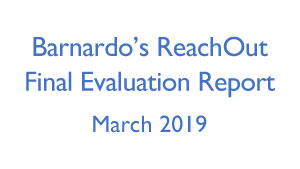
What does it mean to try and 'prevent' young people from being sexually exploited? For the last 3 years we have been evaluating a Barnardo's initiative in Rotherham that has been exploring that question in the context of developing their ReachOut project.
Although there has been a growing interest in preventative approaches to CSE, the concept of prevention in relation to sexual exploitation is not straightforward or uncontentious. Most 'preventative' activities are focused either on children or those responsible for safeguarding them - none of whom are directly able to stop CSE from occurring so long as determined perpetrators are intent on abuse. Commentators have criticised some approaches, highlighting two main risks: first, that preventative approaches can be 'victim-blaming' in implying that responsibility for preventing abuse lies with potential victims and their carers rather than with abusers; second, that some materials and training styles can re-traumatise children and young people who have experienced abuse. ReachOut has been careful to ensure that their messages about prevention clearly hold perpetrators responsible for CSE and actively challenge any form of victim or carer blaming. At the same time, the project has been clear that children and young people have the right to education and support concerning healthy and abusive behaviours and equally clear that it takes the whole community - professionals, families and bystanders - to effectively safeguard children.
ReachOut has developed a model of CSE preventative work that takes a 'whole city' approach and operates at all three levels of prevention: universal, including outreach to raise awareness of CSE in communities across Rotherham and training for adults who may have a preventive role such as taxi drivers and the Fire Service; primary prevention, including healthy relationship education work in schools reaching over 2000 children and young people; targeted prevention with groups and communities considered to be more vulnerable to CSE and direct support for around 300 individual children and young people identified as at risk of exploitation.
ReachOut has worked with a wide range of partners across the statutory and voluntary sectors. Alongside the efforts of many other agencies in Rotherham, its collaborative approach has made a valuable contribution to re-building a culture of trust in the city. It's outreach and educational activities have been positively received by young people and most Rotherham schools have welcomed the input, with many embracing the idea that healthy relationship education is part of their 'core business'.
There is also good evidence that by building warm, respectful relationships with young people - based on listening, understanding, appreciating and believing in them - the project has raised vulnerable young people’s awareness, confidence and self-esteem. Given the situations that had prompted some referrals, it is likely that sexual abuse and exploitation may well have been the outcome without such intervention.
The full report is available here
<< Back to Blogs